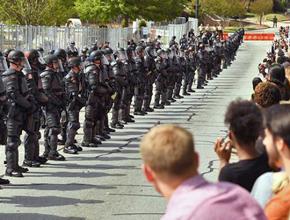Inundated by Nazis...and even more cops
reports on the lessons to draw from the counterprotest against a rally of neo-Nazis in a Georgia town--and the outrageous police response.
RESIDENTS OF the small town of Newnan, Georgia, about an hour south of Atlanta, were besieged by a frightening display of violent hate from neo-Nazis--and from police--on April 21.
Some 25 neo-Nazis marched in an annual "celebration" of Hitler's birthday of the National Socialist Movement (NSM), culminating in a nighttime rally at which they burned a large swastika.
But the 300 or so anti-fascists who gathered to oppose their hate were treated by the hundreds of police and other heavily militarized law enforcement officials on the scene as if it was the anti-racists who posed a threat.
The town's main thoroughfares were blocked off, and tiny residential streets were patrolled by SWAT teams atop military-style armored vehicles. As is predictable with such a large law enforcement presence, there were arrests--but it wasn't the Nazis who were the target, it was the counterprotesters.
Georgia law enforcement lived up to its reputation by arresting at least 10 anti-fascist protesters. In particular, officials cited a 1950s law against wearing masks as a pretext for several of the arrests.

The irony is that the law was enacted to crack down on Ku Klux Klan rallies.
"We were peacefully protesting, yet they put guns in our faces and told us to take our masks off. It made no sense," 19-year-old activist Jeremy Ortega, who was charged for wearing a mask, told the Atlanta Journal-Constitution.
This is in stark contrast to the behavior of law enforcement at the Unite the Right rally in Charlottesville, Virginia, last year--where police stood by passively as violent white supremacists shot at, beat and physically intimidated anti-fascist protesters, culminating in the killing of anti-racist activist Heather Heyer.
In Newnan, police opted to enact a temporary military-style occupation and pre-emptively arrest anti-fascists.
Georgia Bureau of Investigation Director Vernon Keenan was smug, suggesting that protecting property was more important than protecting residents and activists from the neo-Nazis: "Making arrests in a volatile situation is never going to be pretty...We didn't have civil disorder, property damage. And we had just a few arrests. We are absolutely satisfied."
DESPITE THE overwhelming police presence, it's important to note that while the neo-Nazis applied for a permit for 50 to 100 people, they only managed to draw out some 25 and were easily outnumbered by a 10-to-1 margin by counterprotesters.
The racists had to be escorted into the park by a police brigade, and their planned event lasted less than half of its scheduled time. Clearly, they were not feeling very confident.
Following their hate rally, however, the NSM gathered at a nearby bar at night and, joined by members of the League of the South, burned swastikas. They were more confident on private property, under the cover of darkness.
A debate about if and how to confront the far right--whether to mobilize for a direct counterprotest--played out throughout the weekend. An event called #NewnanStrong was organized for the evening before the neo-Nazi rally as a festival aimed at promoting diversity and acceptance.
Children covered the sidewalks and the park that was to host the rally with sidewalk chalk with messages of acceptance.
The mainstream media predictably counterposed the "good" response of #NewnanStrong to that of the anti-fascist counterprotesters who turned out the following day. But many of the participants who counterprotested the neo-Nazis were wearing #NewnanStrong T-shirts. Grandmothers and young kids were among those who were out holding signs and making sure the Nazis knew they weren't welcome.
In other words, many of the residents felt both a festival and a protest were necessary.
As Kamilah, an anti-racist protester who came from Atlanta, said: "Even though the number and behavior of the cops was really intimidating, we're doing the right thing in standing up to the Nazis. We made sure they knew they are not welcome, even in the Deep South. There's nowhere else on earth I'd rather be today than in these streets."


